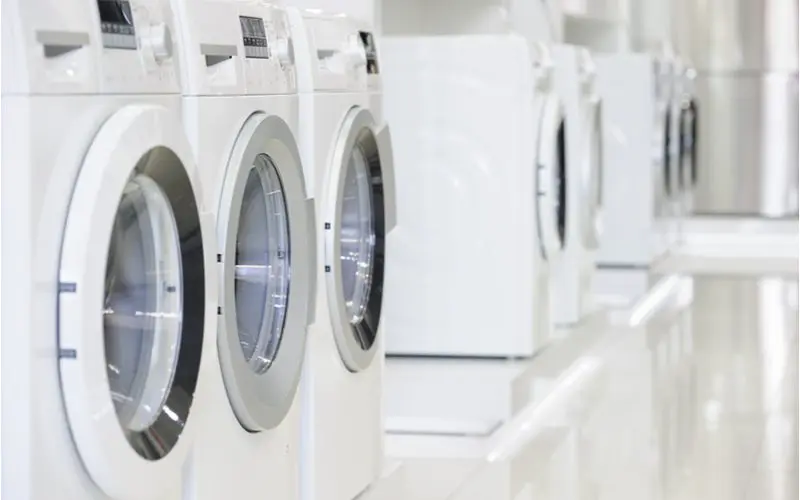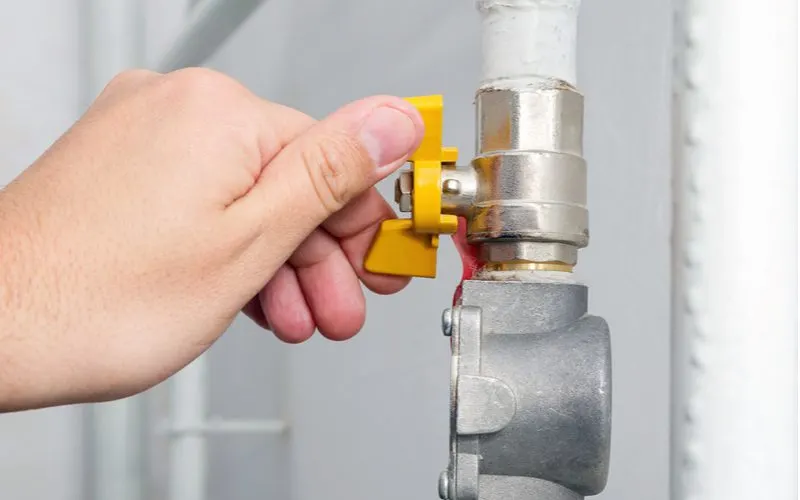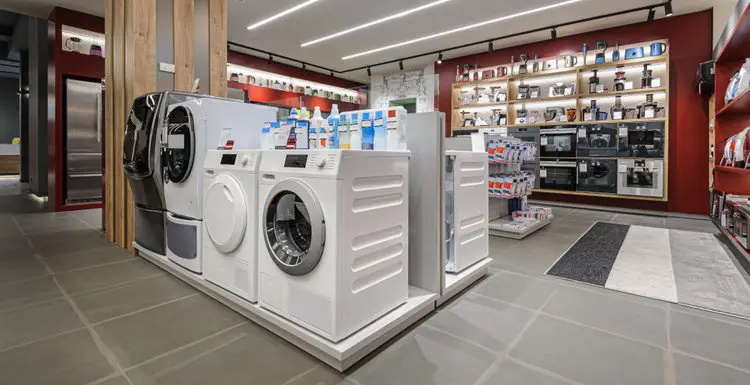What’s the answer to the longstanding gas vs. electric dryer debate?
When considering which dryer is best for you, it’s important to analyze your specific needs and situation.
Read on to find out more about the differences.
Buying a New Dryer?

Serghei Starus/Shutterstock
Shopping for a new dry can be overwhelming. Most people don’t even know if they should shop for a gas or electric model. On one corner of the ring stands the old-fashioned dryer that comes with a high purchase price but low operation costs.
On the other corner, the all-American electric dryer has a lighter upfront cost but is heavier on your utility bill. Both are strong contenders for the title of the best dryer option for your home.
Gas and electric dryers have advantages and disadvantages, different installation processes, safety concerns, and heating capabilities. The best way to pick the winner for your home is to look at each of these factors side by side.
We’ll begin by covering the basics and what makes gas and electric dryers different. At the end of this guide, you’ll be able to choose the dryer type that’s right for your home and avoid timely and costly shopping mistakes.
Gas vs. Electric Dryers: What’s the Difference?

Alpa Prod/Shutterstock
There are two power source options you’ll find when it comes time to shop for a new clothes dryer. But all dryers have the same inner workings. Air pulled into the dryer passes through a heating coil to warm it.
An electric fan circulates heat throughout a dryer and around your tumbling clothes. Molecules from the water in your garments heat up and turn into steam through the evaporation process. A vent then takes the moisture out of the unit through an exhaust tube.
The difference between the two dryer options is how they generate the heat required to dry your clothes efficiently: gas or electricity. Let’s investigate these differences further.
Heat Source
Both gas and electric dryers run on electricity, but a gas dryer requires a gas hookup to generate heat. Gas-powered clothes dryers use propane or natural gas to generate heat and electricity to power the controls, lights, fan, and drum.
An electric dryer operates on a 240-volt current to fuel heating coils, which is twice the standard household current. Some compact electric dryers can run on a 110-volt current.
Parts and Components
Gas and electric dryers use most of the same parts and components. However, gas dryers connect to natural gas lines as the heat source.
They also feature a few parts you wouldn’t find in an electric dryer. They include gas valve coils (solenoids), a gas connection, ventilation components, and an igniter.
Performance
Gas and electric dryers aim to work the same way, but there are marginal performance differences. Gas dryers dry a load in about half the time of an electric dryer. This is because gas dryers generate heat more quickly.
Their burners fire immediately and produce instant heat. Heating elements in electric dryers take longer to warm up and never get as hot as a gas burner. So you’ll wait on those sheets and jeans longer. Gas-dried clothes have less static cling.
Gas dryers also keep clothes from wrinkling because the unit dissipates heat faster at the end of a cycle. The cycle range and additional features, such as motion sensors, are consistent between electric and gas versions of the same dryer.
Plus, warranties are consistent between both versions of dryers. But the repair costs if something goes wrong outside of the warranty have a significant difference.
It’s easier to repair your electric dryer than a gas dryer, which could require bringing in a qualified technician.
Method of Heating
An electric dryer uses electricity to run heating coils and motors, while gas dryers use propane or natural gas and electricity to work.
A burner converts the gas into heat via a dedicated gas line, while an electrical outlet powers the blower motors and drum.
Initial Cost
Most gas dryers comparable to an electric model will set you back $50 to $100 more. The mechanical components are costly, which drives the price of a gas dryer up. Electric dryers cost between $250 and $1,500.
Gas dryers cost between $350 and $1,600. High-end electric dryers may come at a similar cost to that of a gas dryer, but they have all the whistles and bells you could ever want.
Operating Costs
We rate gas dryers in British Thermal Units, so you need to convert the BTUs on the back label to therms to determine how much it costs to run the unit. Therms are what utility companies charge for gas.
The typical gas dryer uses approximately 11,000 BTUs per hour. Since a therm equals 100,000 BTU, it means the dryer uses about .11 therm hourly.
Gas costs about $.11 an hour, and electricity to power the gas dryer’s drum is about .15 per kilowatt-hour. This means it costs $.12 an hour to run a gas dryer.
A gas dryer comes out of the factory set up to work with natural gas. You can run the unit off of liquid propane (LP), but you’ll need the manufacturer’s repair kit that’s sold separately. Propane is a common fuel source for many homes.
But natural gas is usually 1/3 cheaper. There’s a cost for the LP conversion kit and the actual conversion process. The total materials and labor costs are often less than $100, but check with the appliance installer.
Electric companies charge by the kilowatt hour, so calculating the cost of running an electric dryer means you need the kilowatts it takes to run the unit for an hour.
The formula to determine usage is: watts x hours used / 1,000, and you get total kilowatt-hours
Electric dryers use between 1,800 and 5,000 watts, or 1.8 and 5-kilowatt hours. Using Northern California PG&E tiered rate plan rates at $.33 per kilowatt-hour as an example, most electric dryers average between $.59 and $1.65 per hour.
An electric dryer costs more to operate because electricity is more expensive than natural gas. A ventless condensation electric dryer can offer more operating cost savings compared to the traditional vented model.
The cost of converting a single electric dryer to natural gas may or may not be worth it. Utility costs in your location and the availability of fuel sources should help influence your decision.
Installation Requirements
Gas and electric dryers have different installation needs. The gas dryer requires both a standard electrical outlet and a gas hookup, while electric models need a 240-volt outlet. Both types of dryers require a vent that runs outside or into your HVAC system.
But ventless electric dryers do not require a vent. Make sure you see the hookups available in your laundry space before purchasing a dryer for the first time. Otherwise, look at your current dryer, and if it’s hooked up to plumbing, get a gas dryer.
You need to bring in a licensed technician or plumber to install a gas dryer and ensure the connections are secure. Installing an electric dryer is as simple as hooking up the vent and plugging it in.
Energy Efficiency
A clothes dryer is probably the most energy-hungry device in your home. Shopping for a new dryer is the perfect opportunity to learn about ways to save energy. Generally, gas is a more energy-efficient fuel source for heat generation than electricity is.
This means gas dryers are a better choice if you want to save on electricity. This is in part because:
- A gas dryer heats up much more quickly
- The dryer generates more heat overall
Safety Concerns
Gas and electric dryers present different safety concerns. You can mitigate safety hazards through proper installation, usage, and maintenance.
Safety concerns associated with electric dryers include electrocution and fires. Prevent these hazards by ensuring good wiring conditions, cleaning the dryer, and emptying the lint filter.
Gas-powered dryers can cause natural gas or deadly carbon monoxide to leak into your home, which increases the risk of fire or poisoning. Professional installation reduces these risks, while a carbon monoxide detector near the gas dryer can provide peace of mind.
Gas vs. Electric Dryers: The Pros and Cons

Yevhen Prozhyrko/Shutterstock
This pros and cons list of gas vs. electric dryers is the best way to compare both options.
Gas Dryer Pros
- Uses less in utility costs
- Reduce energy waste
- Dry your load of laundry faster
- Use your standard electrical outlet
Gas Dryer Cons
- Higher upfront costs
- It requires a gas hookup in your laundry space
- You must be close to a vent that goes out of your home
Electric Dryer Pros
- It costs less per load of laundry to operate
- They can be installed almost anywhere in your home
- Cheaper upfront cost
- Easy to fix yourself
Electric Dryer Cons
- They require a 240-volt outlet
- Use more electricity
- It takes longer to dry a load of laundry
Frequently Asked Questions

New Africa/Shutterstock
Can a gas dryer turn clothes yellow?
No. This is a popular myth among homeowners. Using too much fabric softener or detergent and not rinsing well can also cause yellowing.
The high heat of a dryer bakes the residue into the fibers, leaving them yellow or gray.
Chlorine bleach is great for disinfecting, but it can cause yellowing when used on white synthetics such as polyester or nylon.
Do gas dryers have an Energy Star rating?
Yes. Energy Star began rating dryers in 2015. It produces a list of efficient clothes dryers annually based on a Combined Energy Factor (CEF) rating. The higher the CEF on a dryer, the more efficient. Energy Star certified dryers have a CEF rating between 2.68 and 9.75, leading to energy savings up to 60% compared to traditional clothes dryers. The list of the most efficient dryers contains ventless electric models. But the absence of gas dryers on the list doesn’t mean they are not efficient drying options. CEF is not a valuable measure for gas dryers since the rating doesn’t account for non-electric energy use. The CEF rating you find on gas dryers accounts for electricity consumption to power the controls, lights, and drum.
What is a condenser dryer?
A condenser dryer dries your clothes by collecting expelled vapor in a container inside the unit. The reservoir requires regular emptying.
Some models offer an easy way to connect the unit to a drainpipe. This means you don’t need to keep a constant eye on the container water levels.
Gas vs. Electric Dryers: Which One Wins?
Still wondering about gas vs. electric dryers?
They’re quite different in terms of everything, from the power source to safety concerns. Your choice of clothes dryer to buy may just come down to the connections you already have in place.
Also, consider the needs of your family, your budget, and the appliance features you most want before choosing between a gas and electric dryer.

